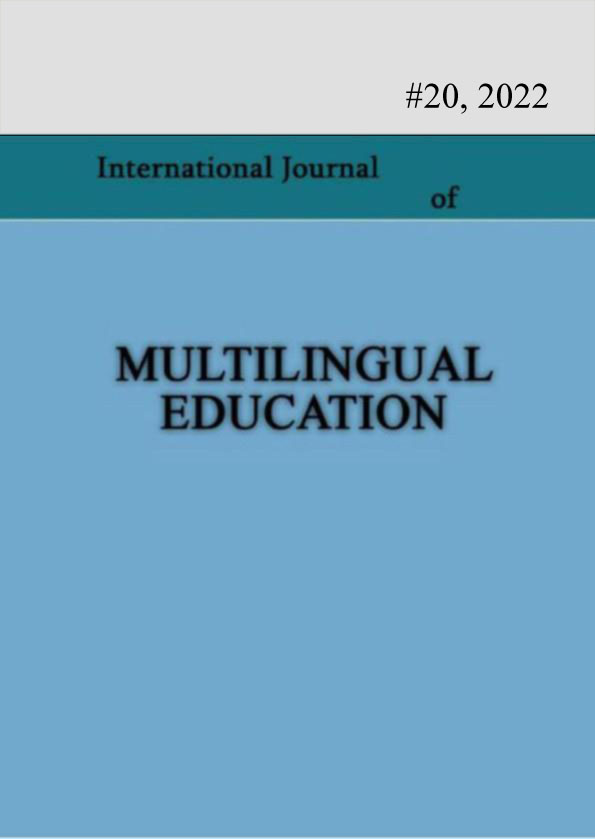Onomastic Material in the Proverbs of Kartvelian Languages: Marking and Generalization
Keywords:
Paremiology; Proverb; Culturology; Onomastics; Kartvelian languagesAbstract
Analysis of the vocabulary of proverbs and identification of the existing thematic fields is extremely important, because the lexical fund of paremic units is very close to everyday speech. Due to the social nature of proverbs, the form and content of a concrete word may point to the place of origin and/or spreading of the proverb. Analysis of the empirical material has proved that even within the related Kartvelian languages there may be thematically diverse paremic units, marked by the influence of local peculiarities. In this regard, special focus should be made on the onomastic material represented in proverbs. Since understanding locally marked proverbs is linked to additional problems for language learners, the issues raised in the article are equally relevant in the context of teaching a second language.
References
Davitiani, A. (1973). ა. დავითიანი, სვანური ანდაზები / Svan Proverbs, Tbilisi: “Metsniereba”.
Grzybek, P. (2014). Semiotic and Semantic Aspects of the Proverb. Introduction to Paremiology: A Comprehensive Guide to Proverb Studies, Warsaw, Poland: De Gruyter Open Poland, pp. 68-111. https://doi.org/10.2478/9783110410167
Jesenšek, V. (2014). Pragmatic and Stylistic Aspects of Proverbs. Introduction to Paremiology: A Comprehensive Guide to Proverb Studies, Warsaw, Poland: De Gruyter Open Poland, 2014: pp. 133-161. https://doi.org/10.2478/9783110410167
Jgharkava, G. (2020). გ. ჯღარკავა, ქართველურ ენათა ანდაზების ლექსიკურ-თემატური მახასიათებლები / Lexical-Thematic Characteristics of Proverbs of Kartvelian Languages, East European University, Collection of Scientific Papers, №2, pp. 149-155.
Jorjaneli, K. (2003). კ. ჯორჯანელი, რჩეული ქართული ანდაზები / Selected Georgian Proverbs, Tbilisi: “Merani”.
Xalx. Siṭq̇v. II. (1991). ქართული ხალხური სიტყვიერება (მეგრული ტექსტები) II / Georgian Folk Speech (Megrelian Texts) II, The text was prepared for publication, with introduction, remarks and research attached by Korneli Danelia and Apolon Tsanava, Tbilisi University Press.
Lejhava, L. (1959). ლ. ლეჟავა, ქართული ანდაზების ენა / Language of Georgian Proverbs, Issues of the Structure of Kartvelian Languages, Vol. I, pp. 139-264, Tbilisi: Publishing House of the Academy of Sciences of the Georgian SSR.
Mieder, W. (2015). Origin of Proverbs. Introduction to Paremiology: A Comprehensive Guide to Proverb Studies, Warsaw, Poland: De Gruyter Open Poland, pp. 28-48. https://doi.org/10.2478/9783110410167
Rusieshvili, M. (2005). მ. რუსიეშვილი, ანდაზა / Proverb, Tbilisi: “Lega”.
Sergienko, O. S. (2016). English and Russian Equivalents to the Proverbs of Czech Active Paremiological Fund. PhD, Saint-Petersburg State University.
Sherozia, R., Memishishi, O. (1994). რ. შეროზია, ო. მემიშიში, მეგრული და ლაზური ანდაზები / Megrelian and Laz Proverbs, Tbilisi: “Msgepsi”.
The database of Georgian idioms and proverbs – www.idioms.tsu.ge (Last access: 23.07.2022).
The materials were recorded during linguistic expeditions to Samegrelo, Laz and Svaneti region, implemented within the framework of the grant (PHDF-21-125).
Published
How to Cite
Issue
Section
License

This work is licensed under a Creative Commons Attribution-ShareAlike 4.0 International License.

